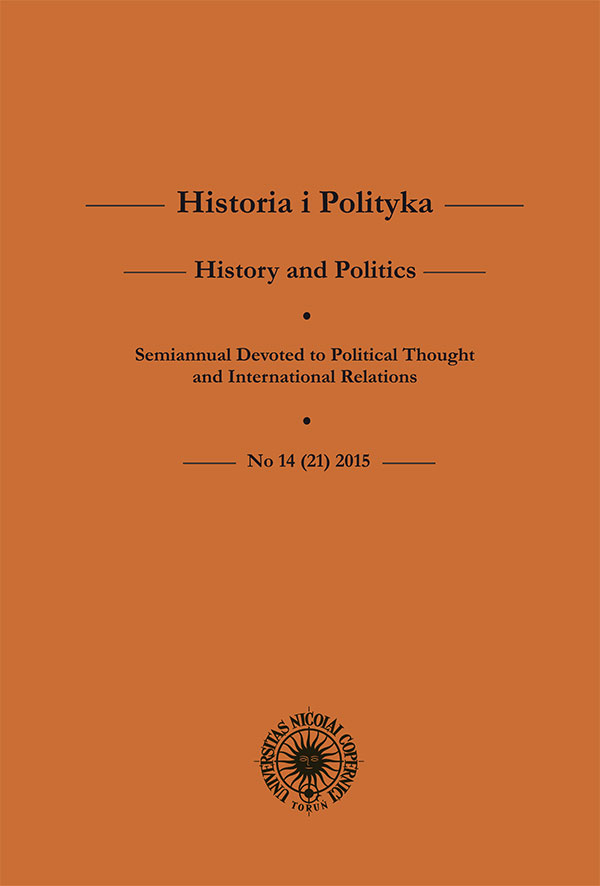Conflict Mediation: The Qatari Experience
DOI:
https://doi.org/10.12775/HiP.2015.026Słowa kluczowe
mediation, conflict management, conflict resolution, Qatar, , foreign policyAbstrakt
The object of the analysis of this paper is Qatari mediation. The role of facilitation as a tool of conflict management in Doha’s foreign policy as well as its modus operandi and the conditions for successful facilitation are the main issues examined here. In conclusion, it is revealed that mediation is only one tool of the Qatari foreign policy among many others. Moreover, the presence of the window of opportunity, the conflict parties’ inclusion and cohesion, and the acceptability of an intermediary are crucial for the successful conflict mediation. The use of reward power, the absence of the follow-up mechanism, the trained administrative staff of the foreign policy apparatus, and the war-weariness are the main obstacles for the transformations of Qatari conflict mediation into conflict resolution.Bibliografia
A. F. Cooper, B. Morami, Qatar and Expanded Contours of Small State Diplomacy, The International Spectator: A Quarterly Journal of the Istituto Affari Internazionali 2011, no. 3 (46), p. 132.
Charter of the United Nations, https://www.un.org/en/documents/charter/index.shtml (accessed 27.05.2015).
Convention for the Pacific Settlement of International Disputes, https://verdragenbank.overheid.nl/en/Verdrag/Details/002330 (accessed 27.05.2015).
D. B. Roberts, Qatari Mediation, http://www.academia.edu/336597/Qatari_Mediation (accessed 27.05.2015).
H. M. A. Keens-Soper, K. W. Schweizer, The Art of Negotiations with Sovereign Princes [in:] The Art of Diplomacy: Francois de Callieres, ed. H. M. A. Keens-Soper, K. W. Schweizer, Boston 1994, p. 73.
J. Bercovitch, The Structure and Diversity of Mediation in International Relations, [in:] Mediation in International Relations: Multiple Approaches to Conflict Management, ed. J. Bercovitch, J. Rubin, Basingstoke 1992, pp. 7, 16.
J. H. Barton, M. C. Greenberg, Lessons of the Case Studies [in:] Words Over War: Mediation and Arbitration to Prevent Deadly Conflicts, ed. M. C. Greenberg, J. H. Barton, M. E. McGuinness, Lanham 2000, pp. 346, 352, 366.
J. R. Berridge, Mediation [in:] J. R. Berridge, Diplomacy: Theory and Practice, Basingstoke 2010, p. 246.
J. R. Berridge, Prenegotiations [in:] Diplomacy: Theory and Practice, Basingstoke 2010, p. 37.
J. Z. Rubin, Conclusion: International Mediation in Context [in:] Mediation in International Relations, [in:] Mediation in International Relations: Multiple Approaches to Conflict Management, ed. J. Bercovitch, J. Rubin, Basingstoke 1992, p. 253.
K. C., Ulrichsen, Qatar's Mediation Initiatives, NOREF Policy Brief 2003, pp. 1-2.
L. Susskind, E. Babbitt, Overcoming the Obstacles to Effective Mediation of International Disputes [in:] Mediation in International Relations: Multiple Approaches to Conflict Management, ed. J. Bercovitch, J. Rubin, Basingstoke 1992p. 45.
M. Kamrava, Mediation and Qatari Foreign Policy, Middle East Journal 2011, no. 4 (65), pp. 543, 548, 551-552.
R. F. Worth, Qatar, Playing All Sides, Is a Nonstop Mediator, The New York Times, http://www.nytimes.com (accessed 25.05.2015).
Religion, Prestige and Windows of Opportunity? (Qatari Peace-making and Foreign Policy Engagement), ed. S. J. Hansen, Noragric 2013, no. 48, pp. 1, 8, 13, 28, 60.
S. Barakat, The Qatari Spring: Qatar’s Emerging Role in Peacemaking, Kuwait Programme on Development, Governance and Globalisation in the Gulf States 2012, no. 24, p. 18.
S. Pulliam, Qatar’s Foreign Policy: Building an International Image, Khamasin: The Journal of the American University in Cairo’s Department of Political Science 2013, pp. 3, 4, 60.
Pobrania
Opublikowane
Jak cytować
Numer
Dział
Licencja
Uniwersytet Mikołaja Kopernika w Toruniu respektuje prawo do prywatności i ochrony danych osobowych autorów.
Dane autorów nie są wykorzystywane w celach handlowych i marketingowych. Redaktorzy i recenzenci są zobowiązani do zachowania w poufności wszelkich informacji związanych ze złożonymi do redakcji tekstami.
Autor, zgłaszając swój tekst wyraża zgodę na wszystkie warunki i zapisy umowy licencyjnej (określającej prawa autorskie) z Uniwersytetem Mikołaja Kopernika w Toruniu.
Statystyki
Liczba wyświetleń i pobrań: 1231
Liczba cytowań: 0



